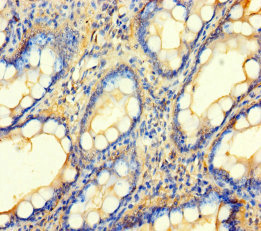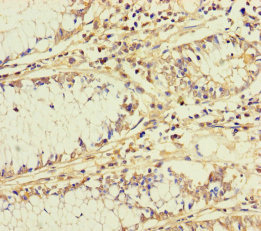Full Product Name
Rabbit anti-Homo sapiens (Human) BCO1 Polyclonal antibody
Alternative Names
BCDO antibody; BCDO1 antibody; BCDO1_HUMAN antibody; BCMO antibody; Bcmo1 antibody; BCO antibody; BCO1 antibody; Beta,beta-carotene 15,15'-monooxygenase antibody; beta-carotene 15,15'-monooxygenase 1 antibody; Beta-carotene dioxygenase 1 antibody; FLJ10730 antibody
Immunogen
Recombinant Human Beta,beta-carotene 15,15\\\'-dioxygenase protein (1-300AA)
Immunogen Species
Homo sapiens (Human)
Conjugate
Non-conjugated
The BCO1 Antibody (Product code: CSB-PA864015LA01HU) is Non-conjugated. For BCO1 Antibody with conjugates, please check the following table.
Available Conjugates
| Conjugate |
Product Code |
Product Name |
Application |
| HRP |
CSB-PA864015LB01HU |
BCO1 Antibody, HRP conjugated |
ELISA |
| FITC |
CSB-PA864015LC01HU |
BCO1 Antibody, FITC conjugated |
|
| Biotin |
CSB-PA864015LD01HU |
BCO1 Antibody, Biotin conjugated |
ELISA |
Purification Method
>95%, Protein G purified
Concentration
It differs from different batches. Please contact us to confirm it.
Buffer
Preservative: 0.03% Proclin 300
Constituents: 50% Glycerol, 0.01M PBS, PH 7.4
Tested Applications
ELISA, IHC
Recommended Dilution
| Application |
Recommended Dilution |
| IHC |
1:20-1:200 |
Storage
Upon receipt, store at -20°C or -80°C. Avoid repeated freeze.
Lead Time
Basically, we can dispatch the products out in 1-3 working days after receiving your orders. Delivery time maybe differs from different purchasing way or location, please kindly consult your local distributors for specific delivery time.
Usage
For Research Use Only. Not for use in diagnostic or therapeutic procedures.








